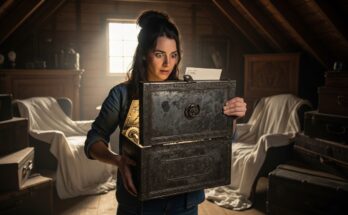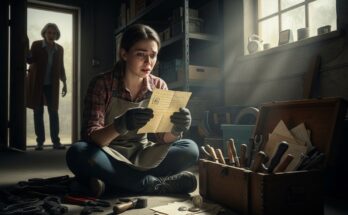Julian, a high-powered CEO accustomed to his every whim being catered to, was fuming. His flight was delayed, and the gate was a sea of humanity, each person a potential obstacle in his path. He spotted the only open seat, tucked away in a quiet corner, but a young woman was meticulously laying out her art supplies on the seat next to it, her canvas a riot of disorganized colors. He approached her, his voice dripping with condescension. “Excuse me,” he said, not even making eye contact. “This is an airport, not an art studio. I need that seat. Move your things.”
The woman, a freelance artist named Anya, looked up, a soft smile on her face. “I’m sorry,” she said, her voice gentle. “I’m trying to finish this commission before I board. But I can move.” She quickly gathered her things, her hands shaking slightly, and moved to another section of the terminal. Julian, feeling a sense of self-righteous satisfaction, settled into the seat and immersed himself in his work, completely forgetting the brief, unpleasant encounter.
Hours later, Julian was in the air, his private jet soaring through the clouds. He was in a meeting with his board, presenting a new business venture. Suddenly, his vision blurred, and a searing pain shot through his chest. He collapsed, clutching his chest, the room a spinning vortex of fear and confusion. He was having a massive heart attack. The flight crew, trained in emergency medical procedures, rushed to his side, but it was clear that his condition was rapidly deteriorating.
Anya, who was a passenger on the same flight, had been sitting in the back, working on a new painting. She had seen the commotion and had come to the front, her face a mask of quiet concern. She was a trained first responder and had a small, portable defibrillator in her carry-on bag, a device she had purchased after a family member had a heart attack. She saw Julian’s condition, saw the fear in the eyes of the flight crew, and knew what she had to do. She worked quickly, her hands steady and sure, and in a matter of minutes, Julian was stabilized.
When he awoke, he was in a hospital room, surrounded by his family. He was told about the woman who had saved his life, the woman who was also on his flight. He was told about her skill, her professionalism, and her quiet heroism. He didn’t know who she was, but he knew he had to find her. He called his assistant, who, with a few clicks of a button, found her. He went to her studio, a small, cluttered space filled with art and love, and he saw the painting he had so carelessly dismissed. He saw the kindness in her eyes, and he knew he had to apologize. He did so, and his apology was not about the money, but about the profound, humbling lesson he had learned.


